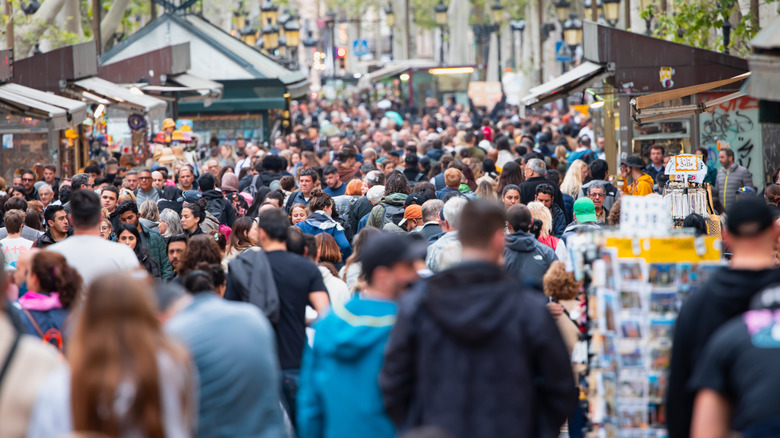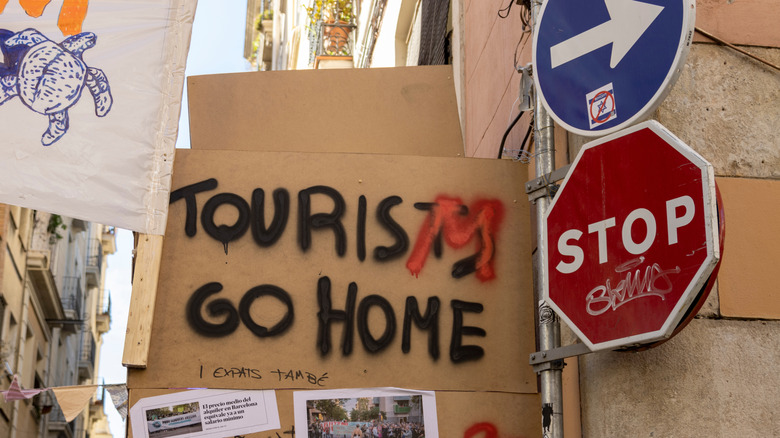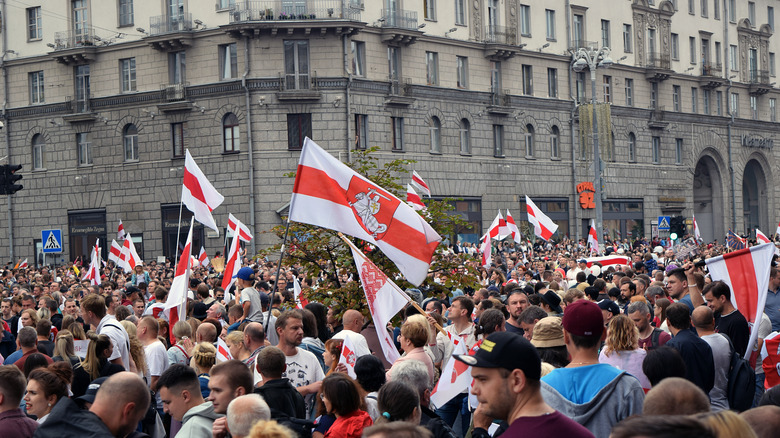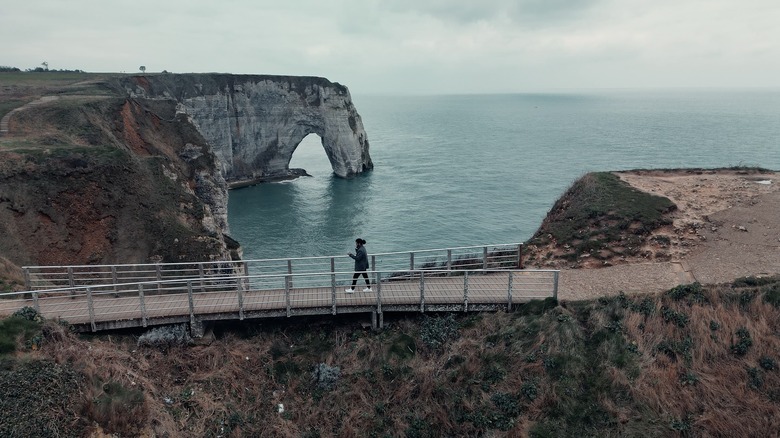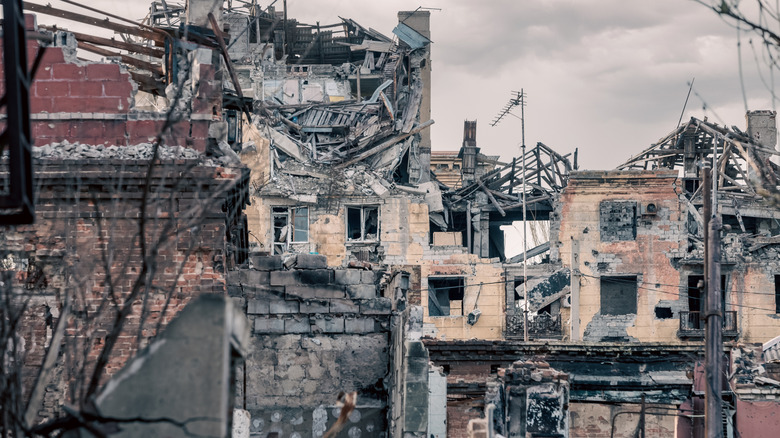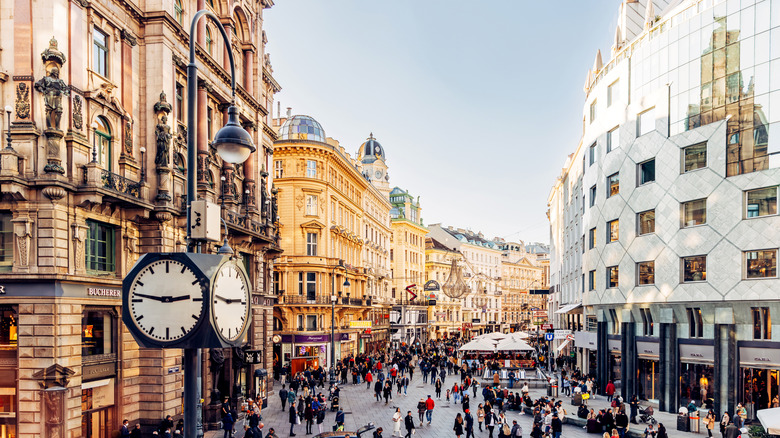From Political Unrest To Overtourism, These Are The European Destinations To Avoid In 2025
Locals are beginning to push back against tourism in Europe. Barcelona has experienced mass anti-tourism protests, Alfacinhas in Lisbon have been making noise against uncontrolled tourism, and locals tired of losing beachfront access in Paros, Greece, took their towels up in protest of private cabanas. It got so bad that BBC News crowned 2024 "the year tourism fell apart," and that was all before the American government very publicly antagonized its European neighbors.
It's not that farfetched to imagine a road that ends with American tourists feeling some serious heat this summer. If you want to head to the European continent during its busy season, where not to go is as important as where to go. Of Europe's tourism-heavy countries, five have been sending strong signals that 2025 might not be their year. These countries have either recently seen large-scale anti-tourism protests, record high visitor numbers, or signs of political upheaval – things like anti-foreigner political movements taking hold or protestors jailed en masse.
Before we dive into the rankings, let's make one thing abundantly clear: You will still find beauty in all the places on this list. European nations, just like America, should not be defined by their worst moments. Still, this is not the best year to visit the destinations we'll look at today, especially during the peak seasons like May through September.
Spain
The Spanish response to over-tourism is one of the loudest of any country on this list. Across Spain, Locals are making it abundantly clear that they want all travelers to think twice before booking an Airbnb. Citizens of Barcelona armed themselves with water guns and sprayed travelers while chanting "Tourists go home," a moniker that has popped up in the form of chants and graffiti on islands, archipelagos, and small towns nationwide. Mallorca, cheerfully known as a sun-soaked haven of rich history and Mediterranean charm, is going through a housing crisis that prompted over 10,000 people to protest short-term rentals and over-tourism.
Similar marches have also popped up in the Canary Islands, with activists taking to the streets bearing signs that say things like "Take back your drunks, give back our homes." In Tenerife, locals conducted a 20-day hunger strike in protest of new investments in the city's tourist infrastructure. Activists in Malaga told the BBC News that "people feel like the city is collapsing."
Spain is clearly a beautiful vacation destination. Between the rich histories of its cities and the natural beauty of its thousands of miles of pristine coastline, it was the second-most visited country in the world in 2024. But right now, it's tough to find a spot in Spain that's not actively telling tourists to stay at home, so we should maybe listen to them.
Belarus
Belarus just finished a presidential election in which the incumbent, Alexander Lukashenko, dominated the competition and received over 80% of the vote. In his victory speech, President Lukashenko called his country a "brutal democracy," but others have called it just brutal. Both the United States Embassy in Belarus and the European Parliament called the election a sham. Al Jazeera reported on the election in less than glowing words, saying, "The vote was neither free nor fair because independent media were banned in the country and all leading opposition figures had either been jailed or forced to seek exile abroad."
The international outcry over Belarus' lack of honest elections is not exactly a new development. BBC News reported that since Lukashenko came into power in 1994, Western observers have not considered a single election in Belarus wholly free and fair. Throughout his reign, media outlets have referred to Lukashenko as Europe's last dictator, but protests against the election results have ramped up remarkably since 2020. So far, the regime's response has mainly been to throw dissenters in jail. Considering that some reports say Belarus is currently jailing over 1,000 political prisoners and has jailed 75 foreign citizens for political reasons in the last five years, postponing your trip to Belarus seems like a wise choice.
France
If you've been thinking about vacationing in the city of lights, but don't want to deal with crowds, this might be a great year to check out other cities across the globe with Paris-style vibes. France is the most visited country on Earth. In 2023, the country welcomed over 100 million visitors, and that was the year before it hosted the Olympics. While the Eiffel Tower and the passionate Paris are the main draws, crowds are spreading to towns big and small. Locals are starting to grumble about excessive visitation. Speaking to BBC News, St-Tropez mayor Sylvie Siri channeled this dissatisfaction, telling tourists, "Don't come here in the summer."
You can find similar stories across the country, areas that have blown up in popularity so much that locals are beginning to resent the fame. After George Kay and François Uzan filmed parts of the Netflix series "Lupin" along the iconic cliffs of Etretat, the nearby town saw a tourist explosion that its infrastructure simply wasn't ready to handle. Local wastewater treatment plants are being pushed to the brink, and the cliffs themselves are struggling to hang on. Due to the increase in foot traffic, the site is experiencing more frequent landslides.
Ukraine
Ukraine is the hardest country to slot onto this list. On the one hand, it seems so obvious it's almost not worth mentioning. It's the only country on our list that's also an active war zone. On the other, creating a list of European destinations to avoid and not mentioning Ukraine would be a glaring omission. Besides, the active war zone aspect of Ukraine hasn't stopped people from visiting so far. The damage caused by the war in Ukraine has turned its crumbled streets into popular dark tourism destinations.
Dark tourism is the practice of choosing tragic places for vacations — sites of horrific disasters, assassinations, conspiracies, and war-torn nations. The Telegraph reported that tourists began traveling to see the horrors of the Ukraine war almost as soon as Russian invaders were forced out of towns like Bucha, where Russian troops tortured and executed Ukrainian citizens. In the summer of 2023, Kyiv-based tour guides reported bringing one to two tour groups daily across the most battle-scarred parts of Ukraine. One American dark tourist in Khiv told France24, "Jumping out of planes and partying all night and punching people in the face just didn't do it for me anymore. So what's the next best thing? Going to a war zone." Unless your idea of a perfect road trip is one where the only other traffic is tanks, attack drones, and resupply vehicles, skip Ukraine this year. The casualties of war will still be visible long after the last shells are fired.
Austria
Austria is a dark-horse selection for the European country most overcrowded with tourists. The country may not have the same number of tourists as France or Spain, but it also has far fewer citizens. In peak seasons, foreigners can outnumber locals by almost four to one. Here's the good news: Although Austria experiences significant tourist traffic, it hasn't exhibited the anti-visitor sentiment found in other destinations on our list. The bad news is that overcrowding isn't the only reason Austria made it onto this list.
In addition to Austria's over-tourism struggles, the country is also experiencing a profound shift towards the right. The Austrian Freedom Party (FPÖ), which Reuters described as "Euroskeptic" and "Russian-Friendly," received a higher percentage of the vote than any other party in the country's most recent election. While the party isn't necessarily anti-tourist, they have vocally endorsed sending immigrants back to where their ancestors originally came from, so you can imagine that it could be a weird time to look different in Austria. The FPÖ was shut out of the final coalition government, but the political party is still very much a part of the Austrian consciousness — polling numbers provided by the American-German Institute indicate the party is more popular now than it was during the election in September.
